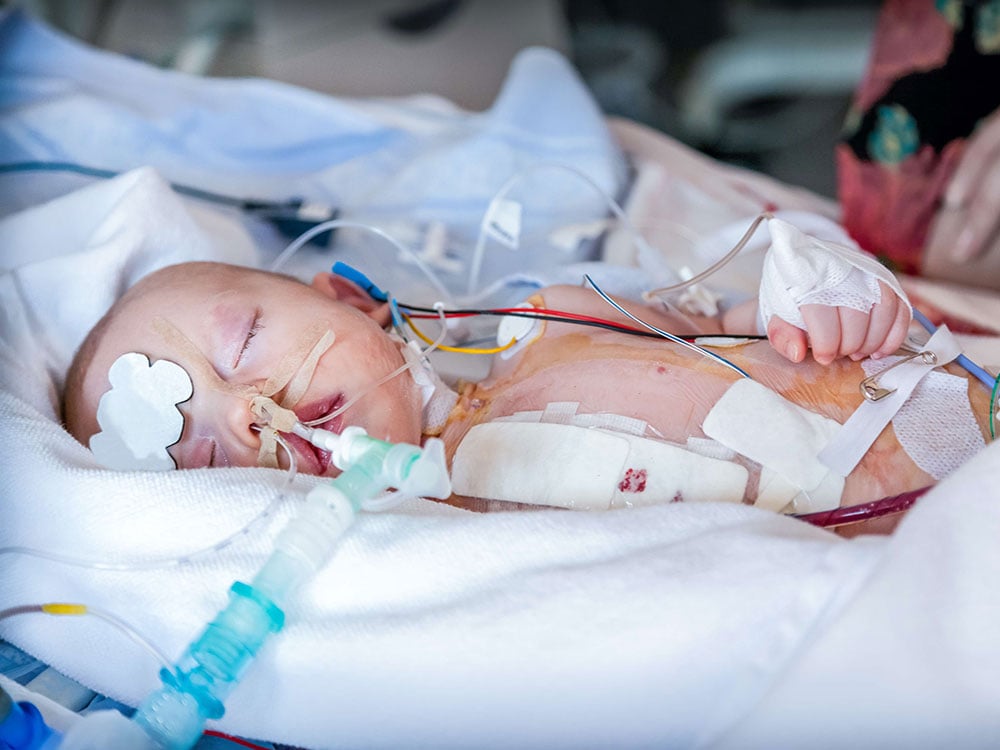A study at BC Children’s Hospital found almost half of emergency surgeries for high-risk infants were delayed, with dire consequences for children.
Surgeons and researchers at the hospital and University of British Columbia have published a study showing that the highest risk pediatric emergency operations are the most likely to be delayed.
The paper, published in the Canadian Journal of Surgery, analyzed 384 emergency surgeries among patients at BC Children’s Hospital between July 11, 2011, and July 30, 2016. One-third of the patients were infants under two.
The researchers found that nearly half of these high-risk surgeries, which needed to be completed within an hour of diagnosis, had been delayed. These delays, they found, contributed to an unintended loss of organ, limb or function in 24.5 per cent of cases and were a factor in the death of 28 children.
Dr. Sonia Anne Butterworth, lead author of the study, has been a pediatric surgeon at BC Children’s Hospital since 2008 and is the assistant dean for postgraduate medical education and a clinical professor of surgery at UBC.
“[If you looked at] two high-risk patients, one who gets to the OR [operating room] when the surgeon had said they needed to, and one who gets delayed,” Butterworth said. “The one who was delayed was more likely to have either major morbidity or die, compared to the high-risk patient who did not have a delay.”
This analysis led them to find that a delayed surgery increased chances of limb, organ function loss or death by 85 per cent.
Room for improvement
Butterworth said some things did improve after the emergency surgery team moved to a new building in 2018, one with 11 operating rooms instead of seven.
An analysis of 1,300 cases between May 2018 and 2019 found a nearly 30-per-cent improvement in the percentage of highest risk emergency patients who made it to their surgeries on time, according to unpublished data shared with The Tyee.
“Although overall the numbers were improved, what we found was that patients who needed stat surgery, needed to be in the OR within an hour, were still the most likely group to get delayed,” Butterworth said, compared with those who needed emergency surgery within four or 72 hours. The most common reason for these delays was the lack of an available operating room.
Butterworth also compared these statistics to SickKids hospital in Toronto where, before the pandemic, emergency surgeries faced delays in about three out of 10 cases. “We still have some work to do,” she said.
Butterworth said case delays for operations needed within an hour have not been tracked since the COVID-19 pandemic began.
Elective surgeries
At BC Children’s Hospital, like hospitals across the country, there is a major backlog of postponed elective pediatric surgeries. But it’s not clear how many.
“I'm not sure if that's public information,” Butterworth said. “All I can say is that it is far in excess of what we usually have on our waitlist.”
Some of this backlog has resulted from the hospital reducing its elective cardiac operating room schedule to free up space for urgent patients in their pediatric intensive care unit, as The Tyee reported in November.
BC Children’s Hospital former pediatric surgeon and chief of cardiac surgery Dr. Sanjiv Gandhi quit his position to join the BC Green Party earlier this year, over concerns about mismanagement at the Provincial Health Services Authority and BC Children’s.
“You show up to work to give the best care you can, and there are so many impediments you can’t control and the public can’t see,” Gandhi told The Tyee then. “You feel handcuffed on a daily basis and it’s driven so many people out.”
Butterworth said elective surgery backlogs and staff shortages may also be causing delays to emergency surgeries.
“The elective surgery patient population has got clear advocates,” Butterworth said, who press for shorter waitlists for common procedures. “The emergency surgery patient population often doesn't so much,” she said, as there are many children and adults needing treatment “across lots of different specialties, whether that's adults or children.”
Butterworth said she worries about the lack of measurement of delays during the pandemic.
“I worry that we're maybe not doing it as timely as we need to, just because we're not measuring it. We weren't doing great before [the pandemic] — we were doing better, but we weren't doing great before.”
The study’s publication has led to a renewed interest in tracking emergency surgery delays among hospital leadership, she said. ![]()
Read more: Health

















Tyee Commenting Guidelines
Comments that violate guidelines risk being deleted, and violations may result in a temporary or permanent user ban. Maintain the spirit of good conversation to stay in the discussion and be patient with moderators. Comments are reviewed regularly but not in real time.
Do:
Do not: